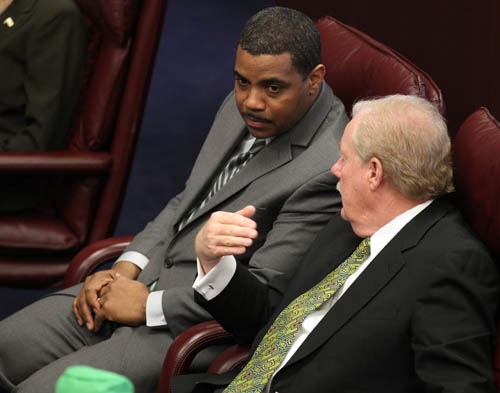Lawmakers reject Caesars’ stadium petition; proposal goes to public vote

CARSON CITY — State senators unanimously rejected an initiative to raise sales taxes on the Strip to build a sports arena on Thursday, meaning the proposal will go to a statewide ballot.
Caesars Entertainment wants a 0.9 percent sales tax in the Strip corridor to finance construction of a $500 million, 20,000 seat sports arena near the Imperial Palace.
The casino giant, through its Harrah’s subsidiary, circulated an initiative petition last year calling for a statewide vote on the plan if legislators didn’t approve the tax increase by today.
By rejecting it, the Senate ensured it would go to the November 2012 ballot and left the door open for its own competing measure that could undermine Caesars’ plan.
Assembly Speaker John Oceguera, D-Las Vegas, said such a proposal could ask voters whether they want the same sales tax rate throughout a county. “The competing measure on the ballot would say ‘Should the sales tax be uniform and equal in all counties,’ ” he said.
If voters approved that, there could not be a higher sales tax in the Strip corridor to finance the arena.
The sales tax rate in Clark County is 8.1 percent. If voters approved the stadium financing plan, then the rate within a three-mile radius of the arena site would be 9 percent.
But lawmakers don’t agree on an alternative ballot measure or even if they would propose one, said Senate Majority Leader Steven Horsford.
“There hasn’t been complete agreement on what an alternative could be,” the Las Vegas Democrat said.
Senators from both parties criticized the sales tax proposal during a break from a floor session Thursday.
“You should not use any public money on it at all,” said Sen. Barbara Cegavske, R-Las Vegas.
Sen. Mike Schneider, D-Las Vegas, said Democrats also oppose the Caesars measure as proposed.
“Nationwide there has been a pushback right now on funding stadiums with tax dollars,” Schneider said.
Schneider expressed concern about what might happen to the sales tax money if it were collected but the stadium weren’t built. He also said lawmakers need to consider whether proposed alternatives could hinder the proposed development of a stadium at the University of Nevada, Las Vegas.
Officials from MGM Resorts International are openly opposed to Caesars plan, which would essentially raise taxes on all Strip customers to pay for Caesars’ stadium proposal.
“Our state has vastly more significant needs than taking tax money to build a stadium on someone’s land,” said Alan Feldman, MGM’s senior vice president of public affairs.
Feldman said given the state of the economy, the unemployment rate and general skepticism about taxpayer-funded stadiums, he said he thinks voters will likely reject the Caesars ballot measure with or without a competing sales tax question to undermine it.
“I don’t know that there needs to be a legislative alternative,” Feldman said.